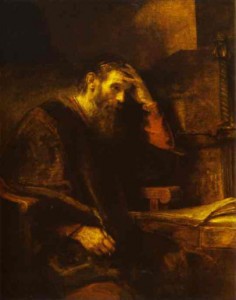It is the thesis of Kenneth Craven in his interesting book, Hamlet of Morningside Heights which is one part autobiography and one part analysis of Hamlet, that Paul’s Letter to the Romans stands behind a good deal of what is happening in Hamlet, perhaps most particularly Romans 12-13 stands behind the soliloquys of Polonius and Hamlet.
The essence of the argument is that Hamlet on the one hand represents the traditional Christian ethic, love thy neighbor, whereas Polonius represents the cynical and self-serving reply ‘exploit thy neighbor’. Hamlet represents feed my sheep, Polonius ‘fleece my sheep’. Here’s the rub however. The speech of Polonius about ‘neither a borrower nor a lender be’ and ‘to thine own self be true’ has ironically become the credo of self-seeking America, where as the actual virtues Shakespeare was touting were those of Hamlet, and he was critiquing the credo of wealth-seeking, it’s all about money folk. As Craven so aptly puts it— “Until now, modern audiences have viewed Hamlet without knowing that Shakespeare has embedded within the play one set of ethics for soul seekers, and a more insensitive credo for bargain hunters.” (p. 54). On this showing Polonius is the grandfather of Ayn Rand’s infamous treatise ‘On the Virtues of Selfishness’. Even more tellingly, Polonius’ heritage bears bad fruit in his own son, whose bad conduct is aptly described as fulfilling Rom. 13.13-14. Talk about the sins of the fathers being visited on the sons.
It is a surprise to me that nowhere does Craven pursue the angle that Hamlet’s speeches are deeply indebted to a text like Romans 7.7-25, but they definitely are. The introspective voice of Romans 7 can be heard echoing in Hamlet’s introspective musings, without question.
There is no doubt in mind that Biblical literacy is one of the keys to understanding and properly reading the Bard’s classic plays, and his sonnets as well. Alas, in our day Shakespeare scholarship and Bible scholarship hardly ever cross paths and are not on nodding acquaintance. When I was at UNC I wrote a paper for Father Devereaux on the Biblical allusions in Shakespeare’s sonnets. He was very pleased with it, and there were some allusions I showed which had not occurred to him. But he reminded me that probably Shakespeare’s own Biblical literacy came to him by way of the Anglican prayerbook with its lectionary texts. I suspect this is correct.
In Shakespeare’s day, and before the KJV of 1611 fame, most people only heard the Bible when it was recited in church in its lectionary readings. In any case, whether directly or indirectly there is no doubt at all that the Bard was deeply influenced by the Bible in the writing of his plays, not least because that first Queen Elizabeth, the defender of the faith, was an admirer of Shakespeare’s plays, and Shakespeare was wise enough to know his audience. His acting troupe was called, among other things, ‘the King’s Men’.













